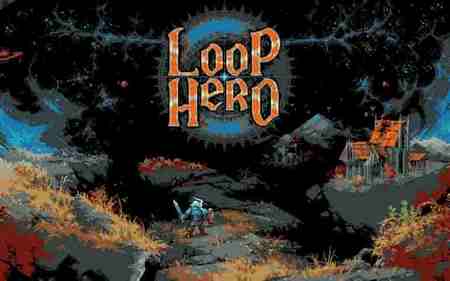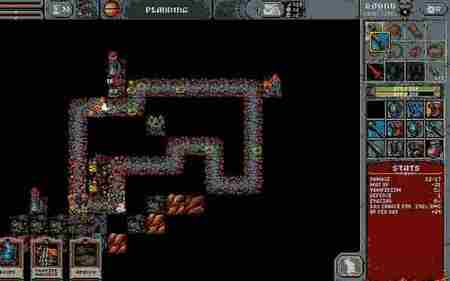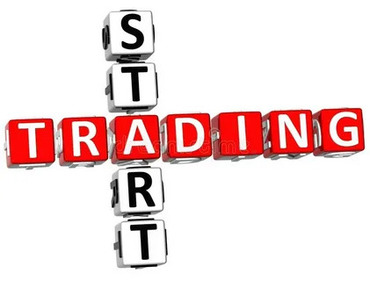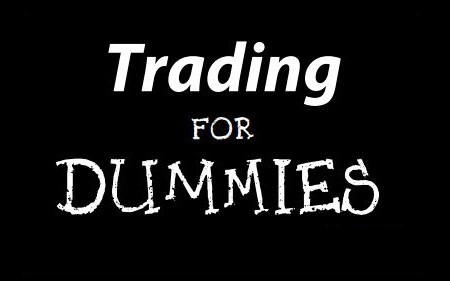Loop Hero — 'bagel' of the Russian studio Four Quarters.
 11 / 11 / 20
Visitors: 748
11 / 11 / 20
Visitors: 748
And the "bagel" is quite inventive — in addition to randomness, there are elements of RPG, card games, and even urban planning games for each new race. At the same time, neither the first, nor the second, nor the third can still be attributed to it. But Loop Hero can be called fascinating, even if its most important gameplay mechanics may at first seem very confusing and not obvious.
"The idea of the game appeared as a reflection on the theme of Zero Player Game [the so-called games where the characters are controlled by AI, and the player's intervention in the process is either minimal or absent at all-author's note], but our vision quickly outgrew the boundaries of this genre, the concept of the game came to life and quickly became overgrown with elements from a variety of mechanics. The resulting cocktail is extremely difficult even for us to attribute to any one or even several genres. Perhaps it is easier to say that Loop Hero is an author's game, which has no analogues now."
The Four Quarters team is in conversation with Kanobu.
The plot is as simple as it gets, but that's the point. The Lich decided to plunge the fantasy world into chaos and created a time loop for that. I also played with the memories of its inhabitants — the few survivors could hardly remember their own names, but everything else for them is like the first time. Most of the questions are raised by the darkness that has engulfed the world. It dissipates when someone remembers something — only then there are paths that once wandered, houses where they once lived, and voices that once sounded.
"Remembering" the features of a dark world is a rare ability. It is unexpectedly discovered by a brave warrior, for whom you will have to play. One day, he wakes up in a campfire and, without thinking twice, goes on a journey along a schematic circular road. From time to time, he "remembers" the forests and villages that he meets on the way, fights with monsters that appeared because of the tricks of the Lich, but each time he returns to the same camp. His goal is to defeat the villain and save the world.
And if the story of Loop Hero can be passed in two paragraphs, then the gameplay is a little more complicated. The fact is that this is a game with indirect control: you can not control the actions of the hero — he independently walks on the map and fights with monsters. You can only create certain conditions around it. Either to simplify his task, or to complicate it.
A logical question arises: can there be an interesting game that, in fact, controls itself? Loop Hero shows you what it can do — and how.
"The original concept revolved around a hero who walks on a looped road and lives on his own, coping without outside help. The player would need to create such conditions around him, in which the hero would develop and become stronger, but at the same time-to keep the balance, without dumping too much complexity on him. During development, we added new elements to this concept, weaving them together into the complex gameplay that you see in the release version."
The Four Quarters team is in conversation with Kanobu .
We are talking about the very elements of the RPG and maps, as well as the opportunity to develop the camp.With RPG elements-the easiest. Traveling along a schematic looped road (this is a thin path, the shape of which each race is generated randomly), visiting various buildings, opening chests and, of course, fighting monsters, the brave hero gets new equipment. In addition, after a while, you can choose a character class. And for killing monsters and completing conditional quests, he is given experience: the hero, of course, grows in levels and can choose a perk on each of them.
The second point is the cards. Again, while traveling along the path and destroying monsters, the character picks up cards that indicate certain "buildings". For example, a map with a mountain-it allows you to place a mountain in the game world and thereby get a valuable resource. Or here's a map with a village-you can put a settlement right on the trail, and take two squares around it with wheat fields. And every time they pass through the village, the character will be treated, but every game day (this is less than half a minute, and the passage of time can be accelerated), evil scarecrows appear in the fields, and sometimes even slugs. Treatment is a positive effect, but each card nevertheless somehow complicates the life of the hero a little. Places new monsters, hits two random warriors during a battle (the hero can also be hit!), attracts wolves, ghosts and vampires to the trail, strengthens existing monsters, places chests, but returns some already killed enemies. And so on.
Some maps — like the same villages or, say, vampire castles-should be placed on or near the trail itself. Other maps — mountains, rocks, fields (all this brings resources) - need to "dot" the world outside the schematic road. It is important, of course, to keep a balance: resources from the "mountain" maps are good, but these same maps from time to time randomly place goblin camps on the map. At any time, the brave hero can be returned to the camp. It is better to do this when the character himself is on the camp cell — then he will not lose anything from the collected resources. However, the further away from the cage you decide to move the hero to the camp, the more resources he will have to leave on the trail.
Why is this important?
Because the resources are needed for the construction of new buildings in the same camp. So, the farm will give an increase in rations (which are also a resource). The hangout will open a new class-the rogue. The herbalist's hut will allow you to take healing potions on an adventure. And the forge, for example, gives the character the initial equipment of a warrior-a sword, a shield and the simplest armor. There are a lot of buildings, and they all give some bonuses. In addition, all buildings can be improved, which also requires resources.

At this point, it may seem that Loop Hero is full of mechanics for the sake of mechanics that do not work properly, but it is not. Moreover, each, absolutely all the mechanics that are in this game are connected with other elements, forming, if you want ,a "gameplay loop", in which the essence lies. For example, in villages, the hero automatically takes quests to kill monsters, but the" target " is chosen randomly from the monsters placed on the path — and this can be a dead slug, or a very dangerous vampire. And do not forget that the "quest" monsters become stronger and more resilient than usual.
Or maps. Exactly which cards will fall into your hand depends on the pool that you need to form while the hero is in the camp. Initially, there are few maps, but some buildings open new ones. And not all of them are equally safe — many provide additional resources, but call on powerful monsters. What if one of them becomes a "quest"?
Finally, you can't endlessly use the cards while traveling, because each card used brings the appearance of the Lich closer. Is it possible not to activate the cards at all? You can, but then the hero may not get the necessary resources. At the same time, each new circle on the path is the next level of monsters. All of them become stronger, new types of opponents appear, and so on. The level of equipment, of course, also increases, but it becomes more difficult to make a profitable build, as the characteristics of weapons and armor vary more and more-and for each benefit, more and more often there is a disadvantage.
"We didn't have a specific source of inspiration, but of course we are influenced by the zeitgeist and the games we love — for example, cult RPGs and diabloids had an extended "item-build" system. And the heyday of popular science education in the CIS brought cosmology and the explanation of magical phenomena analogous to quantum technologies and programming to the plot."
The Four Quarters team is in conversation with Kanobu.
Literally every mechanic in Loop Hero has a meaning. Literally, each mechanic complements the other. All together, they make the game Four Quarters incredibly replayable and extremely exciting. And it's important to note that the whole game is balanced almost perfectly. Almost — because from time to time you still need to go on a journey along the trail just to dig up resources, but not to fight the boss or push the plot a little further. It is difficult to call it a grind, because such situations rarely occur, and yet they are there.
However, working with the balance is still amazing. And this is despite the fact that four people worked on it, although several other developers from outside helped with the Four Quarters game itself.
The only problem with Loop Hero, as far as I'm concerned, is the platform on which the game is currently available. On the PC, playing a "bagel", which involves ten-minute sessions, for example, is very difficult for me. It would be much more convenient to do this on a Switch or mobile platform. At some point, the game, however, may appear there — at least the developers are seriously thinking about the version for the Nintendo portable.
A complete list of unscrupulous brokers, that we do not recommend working with is available here.







